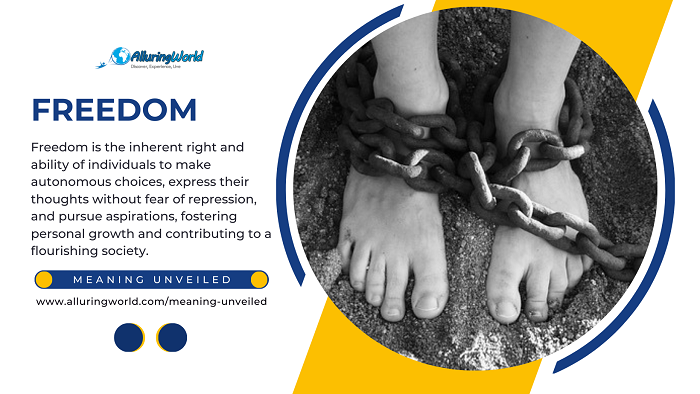Read time ca. 3 minutes
Freedom, a concept woven into the fabric of human existence, stands as a beacon of hope and a cornerstone of societal progress, where its essence permeates various aspects of life, influencing individual well-being, societal dynamics, and the course of history. Let us explore the multifaceted importance of freedom and its enduring impact.
Individual Empowerment:
At its core, freedom serves as a fundamental force that liberates individuals, allowing them to exercise autonomy over various aspects of their lives. This empowerment extends beyond mere decision-making; it encapsulates the liberty to pursue one’s aspirations, unrestrained by external forces. Freedom creates a space where individuals can express their thoughts, beliefs, and values without the looming threat of repression. This intrinsic aspect of personal freedom is essential for fostering an environment that encourages self-expression, creativity, and individuality.
The impact of freedom on personal growth is profound, forming the bedrock for a sense of identity, purpose, and fulfillment. When individuals have the agency to navigate their own paths, they are more likely to discover and pursue their passions, contributing to a richer and more diverse societal tapestry. In this context, the ability to chart one’s course not only enhances personal well-being but also contributes to the collective flourishing of society; a community that values and upholds individual freedoms becomes a breeding ground for innovation, resilience, and the cultivation of unique talents, creating a dynamic and thriving social landscape.
Preservation of Human Dignity:
Central to the importance of freedom is its pivotal role in preserving human dignity. Societies that prioritize and uphold freedom inherently recognize the equal value of every individual, irrespective of their background, beliefs, or identity. In such environments, people are treated with respect, fostering a sense of inclusivity and equality. The acknowledgment and protection of the inherent dignity of every person become the cornerstone of a just and harmonious society. When freedom is safeguarded, it paves the way for mutual understanding and cooperation among diverse individuals, transcending cultural, social, and ideological divides. The interconnectedness between freedom and human dignity underscores the significance of a society that not only grants individuals the autonomy to shape their lives but also ensures a collective commitment to respecting the fundamental worth of each person.
Catalyst for Innovation and Progress:
Freedom stands as a potent catalyst for innovation and progress, unleashing the boundless human potential to create, discover, and improve. Societies that wholeheartedly embrace freedom foster an environment where creativity, scientific advancements, and technological innovation flourish. The unbridled pursuit of knowledge and ideas, free from oppressive restrictions, becomes a driving force propelling societies forward, and individuals, unencumbered by stifling limitations, are empowered to explore new frontiers, challenge conventional wisdom, and push the boundaries of what is possible. This dynamic environment not only fuels individual entrepreneurship and ingenuity but also cultivates a collective spirit of curiosity and exploration. The synergy between freedom and innovation becomes a driving engine for societal progress, propelling advancements across various fields and contributing to the continuous evolution of human civilization.
Social Harmony and Unity:
In a society where freedom is cherished, there is a greater likelihood of social harmony and unity. The recognition of diverse perspectives and the freedom to engage in open dialogue foster understanding and cooperation, furthermore, by allowing individuals to express their views and participate in decision-making processes, freedom becomes a bridge that connects disparate voices, building a more cohesive and inclusive society.
Guardian of Justice and Equality:
Freedom assumes the crucial role of a guardian for justice and equality, functioning as a robust check against tyranny and oppression within a society. When a community values and upholds freedom, it is inherently inclined to prioritize principles of justice, fostering a legal system where laws are fair, consistently applied, and dedicated to safeguarding the rights of all citizens. The intertwining of freedom and justice creates a symbiotic relationship, wherein the protection of individual liberties acts as a barrier against the encroachment of arbitrary power. This commitment to justice, rooted in the principles of freedom, becomes instrumental in establishing a stable and equitable social order, where each individual is afforded a fair and impartial treatment under the law. In essence, freedom becomes a linchpin for building a society that not only values individual rights but also actively strives towards a just and equal framework for all its members.
Conclusion:
In conclusion, the importance of freedom transcends individual liberties; it is a fundamental force that shapes the character of societies and the trajectory of humanity. The empowerment of individuals, preservation of human dignity, stimulation of innovation, promotion of social harmony, and safeguarding of justice collectively underscore the profound significance of freedom in fostering a world where humanity can flourish.

